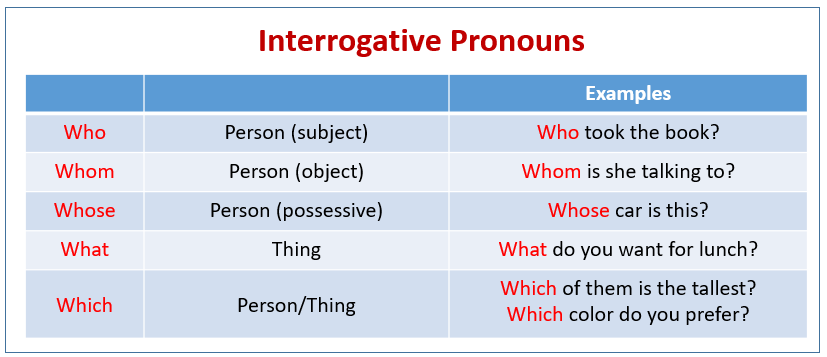

Interrogative Pronouns
More Lessons on English Grammar
IELTS, TOEFL and English as a Second Language
A pronoun is a word that takes the place of a common noun or a proper noun.
In this lesson, we will learn the interrogative pronouns.
Interrogative Pronouns are pronouns used to ask questions. The four main interrogative pronouns are who, whom, whose, what and which.
Who, whose and whom are interrogative pronouns that ask for names of persons.
The following diagram shows examples of interrogative pronouns. Scroll down the page for more examples and explanations on how to use interrogative pronouns.
Who
We use who when the answer is the subject of the verb.
Examples:
Who broke the cup? Paul broke the cup.
Who sang the loudest? She sang the loudest.
Whom
We use whom when the answer is the object of the verb.
Examples:
Whom is she talking to? She is talking to Philip.
Whom did you see? I saw Pater.
Take note that although whom is the correct form for the object of the verb, it is rarely used in normal spoken English. Usually who is used instead of whom.
Whose
We use whose when we want to ask about ownership.
Examples:
Whose is this house?
Whose car did you drive here?
What
What is an interrogative pronoun that asks for names of things.
Examples:
What is the time?
What is your cat’s name?
Which
Which is an interrogative pronoun that asks for a specific person or thing from a group.
Relative Pronouns and Interrogative Pronouns. Interrogative & Demonstrative PronounsExamples:
Which of these bags is yours?
Which of them is the shortest?
Interrogative Pronouns in English
Try out our new and fun Fraction Concoction Game.
Add and subtract fractions to make exciting fraction concoctions following a recipe. There are four levels of difficulty: Easy, medium, hard and insane. Practice the basics of fraction addition and subtraction or challenge yourself with the insane level.



We welcome your feedback, comments and questions about this site or page. Please submit your feedback or enquiries via our Feedback page.